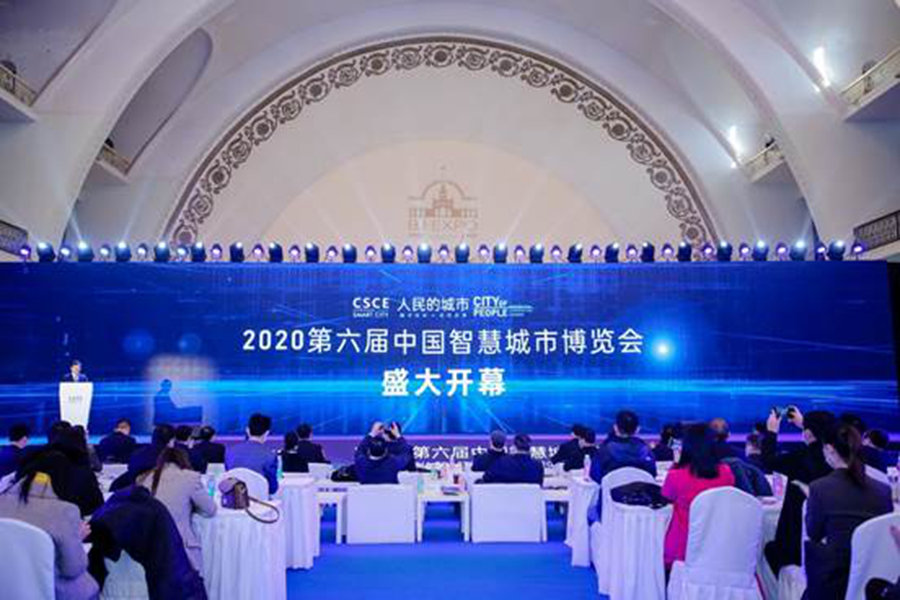
On the morning of December 3, 2020, the 2020 (6th) China Smart City Expo was grandly opened in Beijing Exhibition Centre. Under the joint guidance of the National Development and Reform Commission and the Cyberspacce Administration of China, this Expo is co-sponsored by China Center for Urban Development, China Chamber of International Commerce and Smart City Development Alliance, and undertaken byBraim International Convention and Exhibition Group. With the theme of "People's City-Integrated Growth, Cooperation and Sharing", the Expo will last for 3 days with an exhibition area of nearly 20,000 square meters.

Opening Ceremony
Chen Hongwan, Director of the Department of Finance and Credit Construction of the National Development and Reform Commission, delivered a speech at the opening ceremony. He pointed out that building a new smart city conforms to the development trend of the times and is a powerful support for accelerating the formation of a new development pattern with the domestic big cycle as the main body and the domestic and international double cycles promoting each other. Director Chen pointed out that the construction of a new smart city in the future needs to be done in six aspects: First, adhere to the people-oriented; Second, improve the quality of digital infrastructure; Third, stimulate the vitality of integration and innovation; Fourth, optimize the level of urban governance; Fifth, promote regional coordinated development; Sixth, strengthen cooperation in opening up to the outside world.
Next, Lei Chaozi, Director of the Science and Technology Department of the Ministry of Education, Zhang Bing, Director of the Land and Space Planning Bureau of the Ministry of Natural Resources, and Li Jian, First-level Inspector of the Grass-roots Political Power Construction and Community Governance Department of the Ministry of Civil Affairs, delivered keynote speeches respectively, and made an in-depth interpretation of relevant policies.
Zhou Chenghu, an academician of Chinese Academy of Sciences, gave a wonderful theme report entitled "Prospects for New Smart Cities". Academician Zhou pointed out that today's human development has entered the social era of "human-computer-thing" integration and dynamic interconnection, and the Internet of Everything is reshaping the global social development pattern. Taking the practice of smart cities in Beijing and Hangzhou as examples, he expounded the development model of smart cities in China. In the future, cities will enter the intelligent twin development stage, realizing stereoscopic perception, global cooperation, accurate judgment and continuous evolution, and building smart cities will become the primary industry in the 21st century.
During the keynote speech of "Urban Practice", the guests expressed their opinions.
Pan Feng, member of the Party Group and Deputy Director of Beijing Municipal Economy and Information Technology, introduced in detail the process of building a smart city in Beijing. Beijing has started the construction of digital city since 2000, and the open use of public data has forced the government to improve its management level and ability. According to Deputy Director Pan Feng, Beijing has formulated the Action Plan for Smart Cities in the 14th Five-Year Plan, which will build Beijing into a benchmark city for a new smart city in the world with integrated data as the core, application scenarios as the means, efficient and safe new infrastructure construction as the support, and healthy and sustainable ecology as the original driving force.
Xu Huili, deputy director of the General Office of Shanghai Municipal People's Government and executive deputy director of the Municipal Urban Operation and Management Center, introduced the excellent practical experience of "one network under the same management" and "one network management" in Shanghai. Shanghai uses real-time online data, Internet, big data, cloud computing, artificial intelligence and other modern scientific and technological means to find problems, meet needs, judge the situation and prevent risks in time and accurately. According to Xu Huili, Shanghai will continue to adhere to the value orientation of "practical use", take the principle of "application as the key, and use as the king", pay more attention to empowering grassroots frontline staff, and push urban governance to a new level as a whole.
Zhang Guida, Director of Wuhan Municipal Affairs Service and Big Data Administration Bureau, introduced the positive role of smart city construction in Wuhan's response to the epidemic, and the related applications of smart cities also played a great role in post-epidemic revitalization and high-quality development. Director Zhang introduced the work related to the construction of a new smart city in Wuhan from five aspects: First, optimize and improve the top-level design; Second, fully promote the construction of key projects; Third, continue to carry out data governance; Fourth, accelerate the expansion of 5G applications; Fifth, strive to improve the ability of online government service.
Yang Shaoli, member of the Standing Committee of Guigang Municipal Committee of Guangxi, shared the exploration and practice of smart city construction in Guigang City, and introduced the following three aspects in detail: First, take digital governance as the driving force to promote the modernization of government governance system and governance capacity; Second, take the people's livelihood service as the key point and effectively enhance the people's sense of happiness and gain; Third, focus on data integration and sharing, and empower the business environment to be optimized and upgraded again.
The new book "Digital Transformation Report of China's High-tech Zones", "Research Report of China's Urban Governance Modernization" and "Excellent Cases of Digital Anti-epidemic in Central European Cities" was released at this forum. Subsequently, the establishment ceremony of "County Digital Transformation Professional Committee" and the launching ceremony of the third "Beijing-Tianjin-Hebei-Guangdong-Hong Kong-Macao" Youth Innovation and Entrepreneurship Competition Finals were held. Two high-end dialogues with the theme of "People's City" and "Integrated Growth, Cooperation and Sharing" were held in turn.